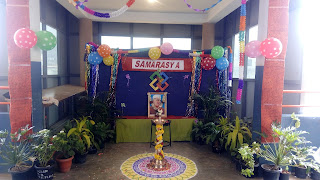To
anyone staying in Karnataka, November 1st is a day of celebration. It’s
Karnataka Rayotsava, i.e. Karnataka Formation Day.
On
November 1st 2016, the same fervour could be felt at one of our partner schools.
The crisp morning air, the children lined up with almost military precision and
the stage all set for the day added to the anticipation and excitement that was
palpable in the air. There were a line of speakers and along the sides, there
were children dressed in traditional clothes ready to perform the traditional
art forms. Amongst all this, there was a considerably large group comprising of
parents and children crowded around team Mantra4Change and a couple of other
people, clutching forms and pens. This was the day, chosen to provide
scholarships to the students who excelled in their studies, but did not have
the financial backing to continue their higher secondary schooling.
Mantra4Change
has found a wonderful partner in Vidya Poshak, an organisation that believes
that poverty should not be a barrier to education. They provide 5-year
scholarship and mentorship support to selected students till completion of
their graduation. Their process of choosing students for scholarship has been meticulously
designed and is two-fold.
Once
the potential candidates were chosen by Mantra4Change based on merit, the
process started off with a written test to assess the academic prowess that the
children possessed. This was followed by a home visit to ensure that the scholarship
went to financially disadvantaged families who were committed to let their
children study further.
This
scholarship support by Vidya Poshak plays a major role by enabling our children
to pursue their studies to create a better future for themselves. Thus, this
Karnataka Rayotsava marked the beginning of a partnership that completes the
cycle of our quest for providing quality education to children irrespective of
their socio-economic background.
This
year, 38 of our students across three of our partner schools got the
scholarship support. The school had graciously invited students from other
partner schools of ours and they set aside a slot just to give away the
scholarships amidst the celebrations, inspiring more students to work harder
because they had to know that there is always help for those who work
sincerely.
As
the state celebrated its formation day, the kids celebrated a new world full of
interesting possibilities for their future and we were the happy spectators.
- The blog piece has been written by Ms. Amrutha Krishnan, who works as the School Transformation lead at Mantra4Change.






























